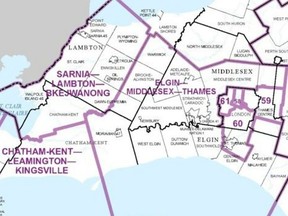EDITORIAL: One too many ridings proposed

Article content
Canada is fortunate to have a system in place that establishes boundaries for political representation but without political interference.
A three-member commission, authorized by the federal government, is charged with developing new boundaries when population growth prompts some change. Such a change is being proposed, deemed necessary because Ontario’s population has grown by 1.5 million since 2011.
Ontario now has 121 federal ridings (the same ridings are used by the province in general elections), but it’s proposed that their number be increased by one, for a total of 122. What that really means is that the average population for every riding would be 116,590 residents, although a deviation of 10 per cent on either side is permitted. The changes would come into effect in April 2024.
However fair and even-handed the proposal might appear, it deals a blow to Chatham-Kent, which is now served by two federal (and two provincial ridings). The commission is proposing that three new federal ridings be created to cover the municipality. The proposal would solve the commission’s challenge of making room for one additional riding in Ontario while maintaining its 116,590-per-riding-population target. But it would create new challenges for Chatham-Kent.
What kind of challenges? Chatham-Kent residents would be lumped into new ridings, some extending as far north as Sarnia, another as far west as Kingsville, and another as far east as Thames Centre, near London.
But the biggest problem is not the geographic reach of the proposed ridings – because some Chatham-Kent residents are already living in the immense riding of Lambton-Kent-Middlesex, which extends as far west as Komoka and as far north as Grand Bend.
The biggest problem is the addition of a third riding. As a municipality, Chatham-Kent’s identity on the federal (and provincial) stage would be further fragmented, its needs and requirements potentially displaced by the needs of, say Sarnia or rural London, parts of which would share the same riding.
It’s a big enough job for the Chatham-Kent council to establish a useful relationship with two federal MPs and two provincial MPPs. But if the commission’s proposal finds approval, the municipality would have to deal with a total of six senior government politicians.
That task is not impossible to achieve, but the commission’s proposal would make it more difficult. Chatham-Kent would be sliced up as one would divide a pie; and its core interests, as they relate to the federal and provincial governments, would be placed at some risk.
-Peter Epp
Postmedia is committed to maintaining a lively but civil forum for discussion. Please keep comments relevant and respectful. Comments may take up to an hour to appear on the site. You will receive an email if there is a reply to your comment, an update to a thread you follow or if a user you follow comments. Visit our Community Guidelines for more information.